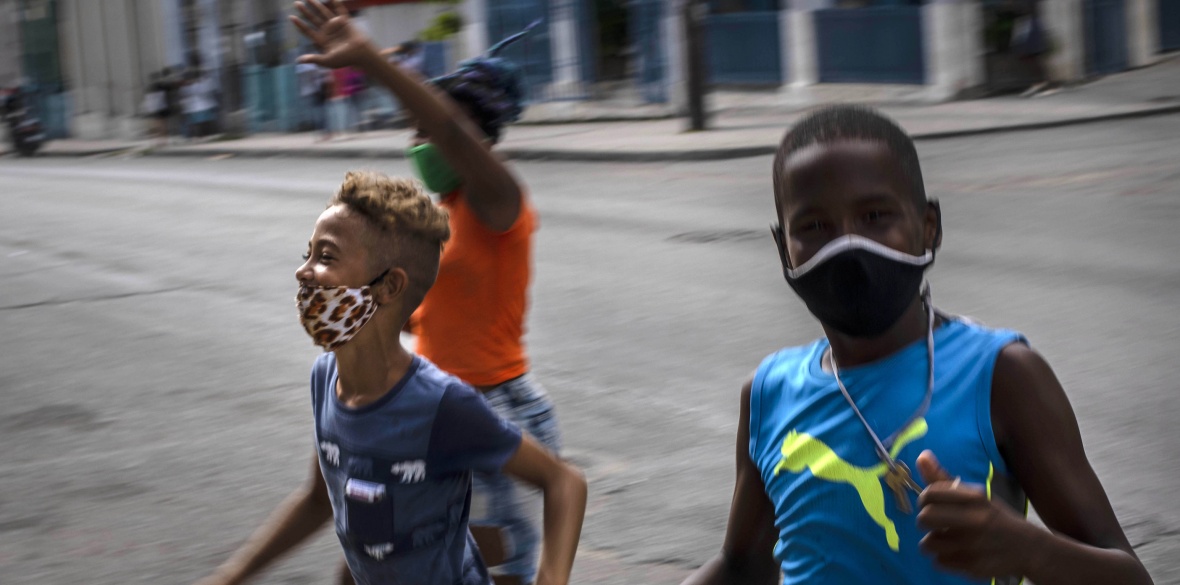This is the last article you can read this month
You can read more article this month
You can read more articles this month
Sorry your limit is up for this month
Reset on:
Please help support the Morning Star by subscribing here
CUBA has been the victim of a blockade by the United States for more than 60 years.
Despite the policies of successive US presidents, the United Nations general assembly has for the last 30 years condemned this blockade and called on those administrations to end it.
On June 23 2021, the general assembly voted by 184 votes, with two against and three abstentions, to end this US blockade.
The Cuba Solidarity Campaign, backed by the majority of trade unions in Britain, campaigns against the blockade and in defence of Cuban sovereignty.
The blockade has an impact on the long-term development of Cuba and on the daily lives of its people.
In the financial year from April 2019 to March 2020 the island’s economy lost $5 trillion.
This has had a direct impact on Cuba’s ability to develop its infrastructure, the economy and even prevented it obtaining necessary medical equipment to deal with Covid and save lives.
The blockade has an extraterritorial impact, hitting non-Cuban companies beyond the island but with direct consequences for Cuba.
Fining of companies has taken place for many years. In 2019 the British-based Standard Chartered Bank was fined $639,023,750. This is one example of many. Today many banks in Britain refuse to handle transactions to Cuba.
In his last year of office, president Donald Trump intensified the blockade, introducing 243 additional sanctions.
However Trump’s desire to control what happens in Latin America was not limited to his policy towards Cuba or even towards Venezuela.
Speaking at the UN general assembly on September 24 2018, he said: “Here in the western hemisphere, we are committed to maintaining our independence from the encroachment of expansionist foreign powers.
“It has been the formal policy of our country since president Monroe [in office 1817-1825] that we reject the interference of foreign nations in this hemisphere and in our own affairs.”
He made his intentions clear — the imperialist Monroe Doctrine was alive and well and supported by the White House.
In other words, nothing should happen in the western hemisphere, including Latin America, unless approved by the US.
Of course many anticipated that the election of President Joe Biden would mean a return to the policies of president Barack Obama.
Obama’s policies however did not propose the end of the blockade nor the normalisation of US-Cuba relations.
They only restored diplomatic relations. A former employee described Obama’s approach as “a policy of subversion by engagement.”
The author, Juan Gonzalez, is currently the deputy assistant secretary in Biden’s Bureau of Western Hemisphere.
The adoption of a policy of normalisation would mean an end to the blockade, recognition of Cuba sovereignty and the withdrawal of the US from its illegal occupation of Guantanamo Bay.
President Biden has not removed a single one of Trump’s sanctions since taking office but, on the contrary, he has added to them.
Biden’s strategic objective towards Cuba remains the same as that of Trump. Both wish to turn Cuba back into a US colony and haven of neoliberalism.
Against this background and the challenges of the Covid pandemic, Cuba has not stood still, producing two vaccines and a programme being rolled out to protect people.
Over 11 million shots of the vaccine have been delivered, with more to come in a programme which aims to vaccinate the whole population with three doses.
There remain many difficulties, not least created by the advent of the new Delta variant, but the blockade itself adds another layer to the obstacles Cuba faces, preventing Cuba acquiring syringes and other necessary materials.
While it will take time everywhere to fight Covid, the blockade on the other hand could be ended today. It is unlawful and inhuman and should end unconditionally.
On July 26 Mexican President Andres Manuel Lopez Obrador said that “it was not enough for countries to vote against the blockade in the United Nations general assembly,” but that it was now time to act against it given that “almost all countries of the world” are against it.
Acting on those words, Mexico has sent two ships with material aid to Cuba while Russia has also delivered two planes of material aid and others are acting similarly.
It is now time that the British government also acted and refused to participate in the blockade.
Some 18 years ago, Fidel Castro predicted that the intervention by the US, Britain and their allies into Afghanistan would lead to a 20-year war. He was right.
Imperialism has created a world of wars. Cuba has demonstrated by sending medical support abroad to many countries that another world is possible.
Oppose the US blockade of Cuba! Defend Cuban sovereignty!
Solidarity with the people of Latin America struggling against imperialism!
Bernard Regan is secretary of the Cuba Solidarity Campaign. This article is adapted form a speech at a recent solidarity event — “Latin America’s Struggle: Opposing US intervention, Neoliberalism & the Far-Right.” For more information about Cuba Solidarity Campaign visit cuba-solidarity.org.uk.












